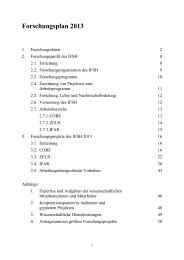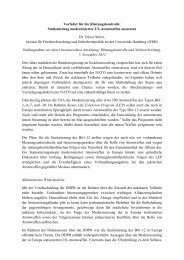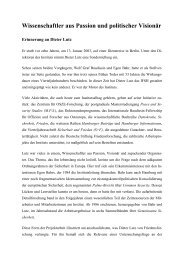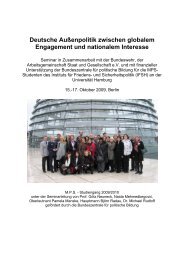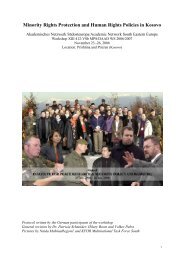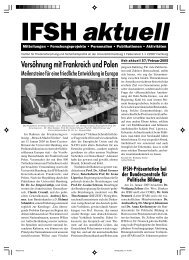Download | PDF - IFSH
Download | PDF - IFSH
Download | PDF - IFSH
Erfolgreiche ePaper selbst erstellen
Machen Sie aus Ihren PDF Publikationen ein blätterbares Flipbook mit unserer einzigartigen Google optimierten e-Paper Software.
lines, thus contact and communication enable higher stages of cooperation rather than mere coexistence.<br />
In Kosovo, seven years after the NATO intervention and five years after the establishment of democratic<br />
provisional institutions, the Provisional Institutions of Self-Government (PISG) has not<br />
until now, developed a comprehensive strategy clearly addressing reconciliation as a necessary step<br />
to improve the relations between Kosovo Albanians and Serbs. According to Lutfi Haziri, Deputy<br />
Prime Minister of Kosovo, the Kosovo PISG faces two main factors preventing the creation of a<br />
national policy on reconciliation. First, the reconciliation process requires all parties that were involved<br />
in the conflict to contribute to the process, and in Kosovo this is clearly not the case. “The<br />
Kosovo Albanians are not the only actors in this process, it is necessary to have the Serbian leaders<br />
cooperate” 20 . The Serbian government has refused to cooperate and has, in fact, successfully exerted<br />
pressure on the Serbian minority in Kosovo to boycott the Kosovo-institutions. 21 If the Serbian<br />
leadership in Belgrade will recognize the new circumstances and stop influencing the actions<br />
of the Kosovo Serbs, by threats or financial support, then opportunities for Kosovo Serb leaders to<br />
cooperate would finally appear. This lack of cooperation has caused great damage to the relationship<br />
between the Kosovo Serbs with the Albanian population. 22 By succumbing to the pressure<br />
from Belgrade, Kosovo Serb leaders set a poor example for local Serbs and thus are responsible for<br />
failing to motivate them to integrate into Kosovar society. According to Haziri, the second factor<br />
preventing national reconciliation is that the Serbian state does not recognize the new reality of the<br />
Kosovo Albanian-led government. “As long as the Serbian government does not recognize the new<br />
reality in Kosovo, it will be very difficult for the government in Pristina to convince the population<br />
that it is time for reconciliation” 23 .<br />
Since the end of 2005 the PISG have continuously tried to fill the gap between political rhetoric<br />
and the actual minority’s needs. The so-called ‘politics of positive discrimination’ of the Kosovo<br />
government, guarantee the Serbian minority the right to be represented at the highest political levels<br />
through their reserved seats in the Kosovo Assembly as well as the right to hold senior positions.<br />
24 However, in order to achieve Dwyer’s broader-magnitude, macro-level reconciliation, governments<br />
need to use their political power and openly declare the start of a process of reconciliation,<br />
or at least publicly recognize the necessity for such a process. In that option, governmental<br />
policies encourage and plan cooperation and provide conditions to build inter-ethnic trust. Cooperation,<br />
in the conception used by the Kosovo government, is a weaker form of the cooperation<br />
stage used by Sluzki, which I describe in chapter two of this thesis. However, both concepts share<br />
the same goal, namely a stable and peaceful condition. As Sluzki emphasizes, no society can skip a<br />
stage within the reconciliation process. 25 Therefore, in order to reach the stage of cooperation, society<br />
needs to work through a previous stage, namely collaboration. Currently though, the communities<br />
in Kosovo range between the first stage of coexistence, where fear, mistrust and resentment are<br />
still strong factors hindering peaceful relations, and the stage of collaboration, where inter-ethnic<br />
relations are still on unstable ground but experiencing various activities for change. 26 The Kosovar<br />
government argues that they have created policies in order to make a link between majority and<br />
minority. “The Kosovo Albanian leadership has been very generous with initiatives to lead the<br />
population towards cooperation and integration of minorities” 27 . However, these two aims represent<br />
deeper stages of development in inter-ethnic relations that can be created only when the communities<br />
already have the possibility for contact with each other and are linked by common interests.<br />
Despite the fact that reconciliation has, until now, not been directly stated, neither as a term nor as<br />
an aim in the strategies drawn by the government, efforts to improve Kosovo Albanian and Serb<br />
relations, through policies promoting tolerance, peaceful coexistence, cooperation, and integration,<br />
20<br />
Compare with: Haziri, Lufti. Deputy Prime Minister of Kosovo. Interview. June 22, 2006. Transl. by author.<br />
21<br />
UN Security Council. Document S/2006/361, pp. 10-23 (2006).<br />
22<br />
UN Security Council Doc. S/2006/45, op.cit., p. 9.<br />
23<br />
Ibid.<br />
24<br />
Compare with: Haziri. Interview.<br />
25<br />
Compare with: Sluzki, op.cit., p. 27.<br />
26<br />
Compare with: Sluzki, op.cit., pp. 24-25.<br />
27<br />
“We are ready to forgive, but the Serbian government has not apologized.” Haziri. Interview.<br />
37






